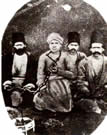arthra
Baha'i
As a theme during the Fast I was thinking about Mirza Badi:
"Of the various writings that make up the Suriy-i-Haykal, one requires particular mention. The Lawh-i-Sultán, the Tablet to Násiri'd-Dín Sháh, Bahá'u'lláh's lengthiest epistle to any single sovereign, was revealed in the weeks immediately preceding His final banishment iii to 'Akká. It was eventually delivered to the monarch by Badi', a youth of seventeen, who had entreated Bahá'u'lláh for the honour of rendering some service. His efforts won him the crown of martyrdom and immortalized his name.
"The Tablet contains the celebrated passage describing the circumstances in which the divine call was communicated to Bahá'u'lláh and the effect it produced. Here, too, we find His unequivocal offer to meet with the Muslim clergy, in the presence of the Shah, and to provide whatever proofs of the new Revelation they might consider to be definitive, a test of spiritual integrity significantly failed by those who claimed to be the authoritative trustees of the message of the Qur'án."
~ from the introduction to The Summons of the Lord of Hosts, p. ii
"Of the various writings that make up the Suriy-i-Haykal, one requires particular mention. The Lawh-i-Sultán, the Tablet to Násiri'd-Dín Sháh, Bahá'u'lláh's lengthiest epistle to any single sovereign, was revealed in the weeks immediately preceding His final banishment iii to 'Akká. It was eventually delivered to the monarch by Badi', a youth of seventeen, who had entreated Bahá'u'lláh for the honour of rendering some service. His efforts won him the crown of martyrdom and immortalized his name.
"The Tablet contains the celebrated passage describing the circumstances in which the divine call was communicated to Bahá'u'lláh and the effect it produced. Here, too, we find His unequivocal offer to meet with the Muslim clergy, in the presence of the Shah, and to provide whatever proofs of the new Revelation they might consider to be definitive, a test of spiritual integrity significantly failed by those who claimed to be the authoritative trustees of the message of the Qur'án."
~ from the introduction to The Summons of the Lord of Hosts, p. ii

